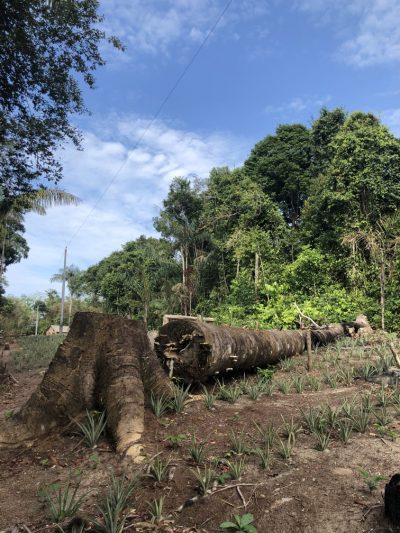Fears of Bolsonaro’s Threat to the Amazon Realized as New Data Shows Rainforest Destruction Up 55%

“Bolsonaro is not only turning a blind eye as land grabbers, illegal loggers, and miners continue to plunder Indigenous territories during the pandemic, he plans to make things easier for them.”
***
Greenpeace on Friday warned of far-right Brazilian President Jair Bolsonaro‘s attacks on environmental law in his country as new data showed that deforestation has “skyrocketed” in the Amazon rainforest this year, particularly in Indigenous territories.
A Greenpeace Brazil analysis found that deforestation on Indigenous lands within the Amazon from January to April 2020 rose by 59% compared with that same four-month period last year. Based on data from the Brazilian Space Research Institute’s DETER monitoring system, the environmental advocacy group accounted for deforestation alerts across nearly 3,259 acres of Indigenous territories so far this year.
From Jan-April, deforestation in Indigenous lands increased by 59% in Brazil. Illegal loggers, miners and land-grabbers don’t work from home, and are taking advantage of the current crisis to invade Indigenous lands, threatening to expose #covid19 to Indigenous People. pic.twitter.com/wwalZ8zKxR
— Greenpeace (@Greenpeace) May 8, 2020
Preliminary data released Friday by the Brazilian National Institute for Space Research (INPE) also revealed a surge in deforestation throughout the country’s portion of the world’s largest rainforest. The 2.7 million square mile Amazon spans nine nations, but the majority of it is in Brazil.
“Destruction in Brazil’s portion of the Amazon increased 64% in April, compared with the same month a year ago,” Reuters reported Friday, citing INPE data. “In the first four months of the year, Amazon deforestation was up 55% from a year ago to 1,202 square kilometers (464 square miles).”
Bolsonaro took office in January 2019 and immediately got to work on his agenda targeting the environment and Indigenous Brazilians. As international scientists have warned over the past year that “human activities are drying out the Amazon,” the Brazilian president has faced global condemnation for rising deforestation and his attempts to open up the Amazon to more agribusiness and mining.
According to Reuters:
The new coronavirus outbreak has complicated efforts to combat deforestation, with environmental enforcement agency IBAMA sending fewer agents into the field due to health risks. The agency has said it will scale back field agents in other areas but not the Amazon.
As deforestation soars, Bolsonaro on Thursday authorized the deployment of armed forces to combat deforestation and forest fires in the region. Environmental advocates say the measure may help in the short term but is not a lasting solution.
Last week, as reporters and activists anticipated the announcement that eventually came Thursday, Marcio Astrini of the Brazilian advocacy group Climate Observatory said that “sending the military to the Amazon is like medicating a disease of the government’s own creation.”
“It’s a medication that has a short-term effect, it will resolve the problem now,” Astrini said. “It won’t cure the disease. The disease that exists in the Amazon today is Bolsonaro.”
Greenpeace pointed out Friday that “Bolsonaro is urging the Brazilian Congress to vote on a law designed to hand illegally deforested land over to land grabbers.”
As the coronavirus pandemic eats its way into the Amazon, raising fears of a genocide of its vulnerable indigenous tribes, the government of Jair Bolsonaro and its supporters are dismantling rules shielding protected reserves. Mine for @guardian https://t.co/DgwchAgpXS
— Dom Phillips (@domphillips) May 6, 2020
Greenpeace also noted that while Indigenous groups have called for greater efforts to protect their territories from land invaders and the pandemic, the Brazilian government has taken take steps backward.
“Bolsonaro is not only turning a blind eye as land grabbers, illegal loggers, and miners continue to plunder Indigenous territories during the pandemic, he plans to make things easier for them,” said Carolina Marçal, a forest campaigner at Greenpeace Brazil.
“Whole groups and communities with no means of combating the virus are at risk of being wiped out if intruders carry Covid-19 into their territories,” Marçal added. “Bolsonaro’s actions are criminal and must be stopped. Those who best protect the forests must be protected.”
Indigenous People in Brazil are facing “an extreme threat to their very survival” with illegal loggers, miners, and other invaders potentially bringing the COVID-19 pandemic to their communities. https://t.co/3Rze6Sd9Q2
— Greenpeace (@Greenpeace) May 4, 2020
While Bolsonaro has provoked international outrage for both his attacks on environmental protections and his handling of the pandemic, Greenpeace USA forest campaigns director Daniel Brindis explained that the Brazilian president isn’t alone in shouldering the blame for the destruction of the Amazon.
“The international market is also complicit in this destruction—and profiting off this crisis,” said Brindis. “As international banks invest in high risk infrastructure in the Amazon, corporations import products like timber, minerals, and cattle products that drive deforestation.”
Those investments from large financial institutions have continued despite warnings from scientists and activists that—as Mercy for Animals managing director Sandra Lopes said last year—”the Amazon rainforest is a fundamental ecosystem for the planet and the climate.” The forest helps limit global heating by serving as a massive carbon sink.
“The alarm has been sounded about the crisis in the Brazilian Amazon for years,” Brindis said, “yet corporations purposefully ignore the fact that their profits are violating human rights and perpetuating climate disaster.”
From Common Dreams: Our work is licensed under a Creative Commons Attribution-Share Alike 3.0 License. Feel free to republish and share widely.
*
Note to readers: please click the share buttons above or below. Forward this article to your email lists. Crosspost on your blog site, internet forums. etc.

